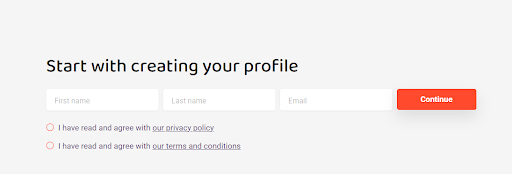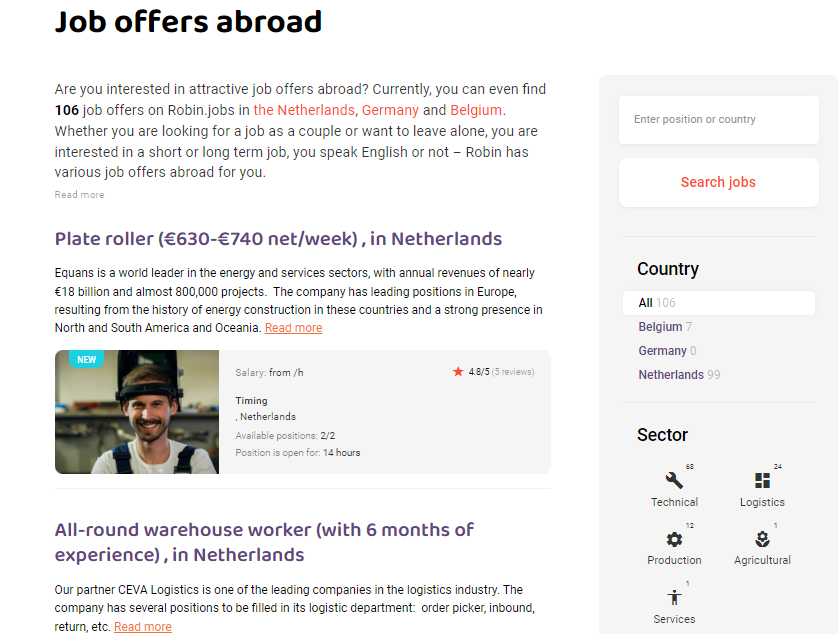Are you eager to take your career to new heights by exploring job opportunities with accommodation in the Netherlands?
Look no further, as Robin is here to be your trusted partner in this exciting journey.
Whether you’re seeking professional growth, cultural immersion, or a fresh start in a vibrant new setting, our comprehensive guide is designed to help you navigate the path to securing your new job.
With our expertise and commitment to your success, we will walk you through essential steps and offer valuable insights to help you find a suitable job in the Netherlands.
Let’s dive in!
Finding a Job Abroad in 4 Steps
We’ve broken down the job search abroad into four easy steps you can understand and follow, from applying to settling in!
First Step: Registering on Robin Website
You’ve probably created your profile for many different platforms a million times, but we want to show you how it looks on our website. It will be easier for you when you know exactly what to expect.
Let’s get started!
Start with Creating Your Profile
The first thing you need to do is fill out your personal information. The most important information you need to provide is your English proficiency level and whether you have a driver’s license. Some job opportunities on our website require you to have a driver’s license, and if you’re looking for a job such as a C or CE driver, you must note which exactly you have.
During the entire process of registration, you have the recruiting manager’s contact information and can seek help or further explanation if you’re struggling.

Choose Fields of Work
Now comes the fun part. You need to select the professions you want to work in.
You have different fields and professions to choose from. Some professions require previous experience, and you will see which professions do and which do not.
Feel free to select multiple professions to increase the number of job offers you’ll receive from our recruiters.
Important note: Be honest about your work experience and skills.
If you don’t have the required experience, don’t select that profession. Potential employers will look over your resume to see if you have the necessary qualifications.
Furthermore, many of them conduct tests with candidates to ensure they have the knowledge and skills listed on their CV.
If you want to work in a job that requires prior experience but you currently lack it, consider taking a course or finding work in your home country for a few months.
You can also look for an entry-level position; we have those available on our website as well.

Select When You’re Ready for Relocation
In the next step, you have to choose the time frame when you’re ready to relocate.
If you are looking to get hired sooner, you will have a lot more options. If you’re not ready to relocate in the next few weeks, you can still apply and wait for the perfect opportunity, but you won’t make the best use of our platform. It is because employers often need people to relocate and start working quickly.
Knowing your goals, plan, and reasons for relocating and starting to work abroad is paramount, as it sets the foundation for a successful and fulfilling journey.
By understanding your objectives, whether they are career advancement, personal growth, cultural immersion, or a new adventure, you can better align your choices and actions with what you truly desire.
When you set your goals and make plans, it will be easier to decide when you want to go and for how long.
After you register, you will get a call from a recruiter. The recruiter will call you to discuss further steps and gather all the necessary information for your job offer.
You Get in Touch With a Recruiter
Keep in mind that you should check your email and WhatsApp to see if a recruiter tried to reach out to you and arrange a call.
After the call, the recruiter will send personalized job offers to you, and you will review them and choose one that suits your goals and preferences.
Second Step: Application
And now, it’s time for the next phase.
Now that you’ve accepted the offer, it’s time to upload your documents. Make sure to carefully follow each step and provide all of the required documentation.
Important note: If you’re uploading pictures of your documents, they must be of high resolution and quality. Make sure that everything is readable to avoid any issues.
Working With Recruiters
With your recruiter, you will discuss the details of your job offer and relocation. The recruiter’s job is to support you every step of the way, helping you prepare for the job interview and making sure your documents are ready.
What differentiates Robin from other recruiting agencies is its dedication to every candidate. Our main goal is to help job seekers find suitable job positions and achieve their goals abroad.
On top of that, every candidate works with the internal recruiter from their country, speaking the same language, which improves overall collaboration and understanding.
Job Interview
Depending on the agency and company, job interviews might look slightly different. Usually, they conduct interviews via telephone or online platforms like WhatsApp and Zoom.
Even though you can’t expect recruiters to do everything for you, they will do their best to help you prepare for the interview.
Check out our social media channels, where you can pick up some great tips and bits of advice necessary for the recruitment process!
Good luck with your interview. If the agency accepts you, it’s time to pack your bags!
Third Step: Relocation
After accepting a job offer, your first order of business is to make travel arrangements to your new country of employment.
It’s important to note that, as the job seeker, you’ll be responsible for covering the expenses related to your travel.
Upon your arrival in the destination country, the staffing agencies’ representatives will be there to assist you. They are well-versed in the local processes and will ensure that your transition is as smooth as possible.
You will sign a pre-contract before the trip and can rest assured that your job position and accommodation will be pre-arranged and ready for your arrival. When you arrive, you will physically sign the job contract at the agency office.
Relocating abroad for a job is a transformative experience that opens doors to personal and professional growth. Embrace the opportunity to immerse yourself in a new culture, broaden your horizons, and develop valuable skills that will enrich your career journey.
Remember, while the initial preparations may require some effort and resources, the long-term benefits of working and living abroad are immeasurable. So, get ready to embark on a life-changing adventure and start the next chapter of your career!

Fourth Step: Settling In
Once you’ve arrived in your new country and joined your new workplace, the settling-in process begins.
This phase ensures a smooth integration into your new environment and work culture.
Depending on the company, you may undergo a few days of training or skill assessment to familiarise yourself with the role and expectations. Embrace these opportunities as chances to learn and grow, and don’t hesitate to ask questions and seek clarification.
The company’s representative will be your valuable guide during this period, showing you around the workplace and introducing you to your new colleagues.
Building rapport with your team members is essential, as they can provide valuable insights and support throughout your journey. Be open and approachable, and demonstrate a positive attitude and willingness to adapt.
Settling into a new country can be both exciting and challenging, so it’s essential to maintain a positive mindset.
Additional Things You Can Do to Get Used to the New Environment
Embrace the local culture, try the traditional cuisine, and explore the surroundings to make the most of your international experience. Be patient with yourself as you adjust to the new environment, as it may take time to feel completely at ease.
Stay connected with friends and family back home, but also make an effort to form new connections locally. Join social clubs, community events, or language classes to meet new people and expand your social circle.
Lastly, remember that adapting to a new work environment and life abroad is a process, and it’s okay to face some uncertainties along the way.
Seek support from your employer, agency representatives, and fellow expats who have been through similar experiences. Robin will help you take care of the entire recruitment process from the moment you apply to the time you start working, but even then, our recruiters are at your disposal.
For everything else outside of work, staying positive, open-minded, and proactive is the best way to overcome challenges.
You May Also Wonder…
How is the trip to the Netherlands organised, and who pays for it?
Robin offers complimentary job and residence search services to all clients. It is important to note that while these services are free, individuals are responsible for organising and covering their travel expenses from their home country to the Netherlands.
After accepting a job offer and submitting the application to the Dutch agency, our team can provide guidance on choosing the best transportation method for reaching the destination. We offer valuable assistance in this process.
Whether it be by airplane, bus, or private transport, Robin is committed to assisting you in making the most suitable and efficient travel arrangements.
Who pays for accommodation in the Netherlands?
Our esteemed partners accommodate individuals who have signed a placement contract with them. However, it is essential to bear in mind that, like in your home country, accommodation expenses are your responsibility.
Even though the accommodation is facilitated through a reputable Dutch agency, it is not free of charge. As part of the arrangement, approximately €100 per week is deducted from your salary to cover the accommodation costs. The cost of accommodation depends on the agency and location, but you will have precise information before relocating.
It is also essential to be prepared for a shared accommodation setup, where you may share the living space and room with other employees working for the same company.
Remember that single rooms might not be available, so you’ll have to share a space with other foreign workers. It is crucial to recognize that lodging providers have strict policies, making it forbidden for guests to bring their pets onto the property.
In the event that the provided accommodation does not meet your preferences or expectations, you have the freedom to explore alternative housing options near your workplace independently. This allows you to find lodgings that align more closely with your individual preferences and requirements.
Our team remains available to offer guidance and support throughout this process, ensuring that your stay in the Netherlands is both comfortable and conducive to a successful work experience.
What salary can I expect while working in the Netherlands?
The salary while working in the Netherlands varies depending on factors such as your profession, level of experience, industry, and the specific company you join.
The Netherlands is known for its competitive wages and strong labour laws, which prioritise fair employee remuneration.
On average, salaries in the Netherlands are often higher than the European average.
As a job seeker, conducting thorough research and considering the specific job market conditions in your field of expertise is essential. You can use online resources, conduct salary surveys, and consult with recruitment agencies to better understand the salary range for your desired position.
Robin’s diverse employment opportunities primarily cater to individuals seeking warehouse, agricultural, and factory positions. Notably, many of these roles do not require specific prior experience or educational qualifications.
Our partners provide their employees with a competitive compensation rate. By working a standard 40-hour workweek, your pre-tax monthly salary is anticipated to fall between €1,600 and €1,700.
How much can I expect to save per month?
To calculate your net salary after taxes and deductions, it’s essential to consider various factors that will impact your take-home pay.
In the Netherlands, having public health insurance is mandatory, and the Dutch agency will deduct approximately €90 per month for this coverage. Additionally, you will be charged income tax based on your monthly earnings, which is typically between 14% and 17% for incomes between €1,600 and €1,700. Accommodation costs are also a consideration, with the agency deducting roughly €100 per week from your salary.
After accounting for these deductions, your estimated net salary will be approximately €1,100.
It’s crucial to be aware of these financial aspects to understand your earnings and plan your budget accordingly. Knowing your net salary will enable you to make informed decisions about your finances and ensure a smoother transition into your new work and life in the Netherlands.
How much money should I take with me when I go to the Netherlands?
Before travelling to the Netherlands, it is recommended to have at least €350 with you.
Taking this precaution will ensure you have enough funds to cover essential expenses and food for the first two weeks in your new home. This is especially important, considering that some agencies pay salaries on a weekly or monthly basis.
It’s essential to note that Dutch agencies typically do not offer meal provisions or financial assistance for food. Nevertheless, many companies boast well-equipped canteens where you can enjoy reasonably priced lunches.
By being financially prepared and taking advantage of these amenities, you can comfortably settle into your new environment and focus on seamlessly transitioning to life and work in the Netherlands.
Who will I sign an employment contract with?
Your future employment contract will be a binding agreement between you and the Dutch recruitment agency. Both parties must adhere to the terms and conditions specified in the contract, which strictly adhere to the minimum requirements regulated by the association of recruitment agencies. The specific type of employment contract offered will vary depending on the agency, and it may be subject to renewal either weekly or monthly after six months of service.
Is speaking English necessary to get a job?
The importance of English language skills at your workplace varies depending on your job type and the number of fellow citizens you’ll be working with.
In most jobs, effective communication in English is a necessity.
If you’re not proficient in English, you should be open to diverse job opportunities, such as meat processing or agriculture roles, where language skills might be less critical.
Do I need to be an EU citizen to work in the Netherlands?
You don’t have to be an EU citizen to work in the Netherlands, but non-EU residents must apply for a residence visa. At Robin, we only work with candidates from the EU who are allowed to work in the Netherlands with their ID or their passport. Having one or the other (or both) is completely fine, and you can apply for jobs on Robin.
Final Thoughts
Following this comprehensive guide will give you valuable insights and practical tips to navigate the job search process confidently.
We sincerely hope that you found our guide helpful and informative on your journey toward securing a job position with accommodation in the Netherlands.
At Robin, we are dedicated to assisting job seekers like you in achieving their dreams of working abroad.
Remember, our services are completely free, and we are here to support you every step of the way.
So, take the first step towards your exciting new adventure by joining Robin today. Let’s work together to turn your aspirations into reality and make your career abroad successful!

 English
English  Lietuvių
Lietuvių  Latviešu
Latviešu  Polski
Polski  Português
Português  Română
Română  Slovenčina
Slovenčina  Magyar
Magyar  Русский
Русский  Espanol
Espanol  България
България  Čeština
Čeština  Italy
Italy  Croatia
Croatia  Greek
Greek 

